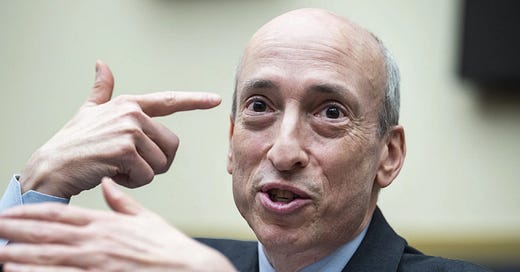Dear readers,
Earlier this week, a favorable ruling for Grayscale in its pursuit to convert GBTC into a proper ETF gave the bitcoin price a nice 5% pop, and a mainstream financial media narrative quickly arrived in which spot ETFs would soon be approved. Bloomberg analysts even moved the odds of approval by the end of this year to 75%. Instead of asking the probability of a broad acceptance of bitcoin ETFs, let’s instead reset and ask ourselves if and why this SEC battle even matters.
Invest in Bitcoin with confidence at River.com/TBL
Securely buy Bitcoin with 100% full-reserve custody, enjoy zero fees on recurring orders, and even buy a hosted Bitcoin miner, completely hassle-free.
Spot versus futures
Bringing it back to basics, let’s first explain the difference between the bitcoin futures ETFs that already trade and the series of bitcoin spot ETFs that have been met with SEC rejection.
The word “spot” in financial markets refers to purchasing the underlying instrument, even if merely a claim from an exchange. For example, buying “spot” bitcoin on an exchange means buying bitcoin and then having the ability to withdraw that BTC to your own wallet using bitcoin’s blockchain. On the other hand, purchasing a bitcoin futures contract on the CME simply exposes one to the price movements of bitcoin but doesn’t give the buyer any ability to withdraw the underlying bitcoin to a proper wallet.
In this way, purchasing bitcoin futures can be easier thought of as a mark-to-market bet on bitcoin’s price. Purchasing spot bitcoin gives owners a much different set of circumstances, including being able to use that bitcoin for bitcoin-native economic activity (such as participating in the Lightning Network to experience instant transactions and low fees).
Investors own futures to bet on bitcoin. People buy spot to own bitcoin. This is a major difference, but for financial players, sometimes the difference simply comes down to arbitrage—whether or not the investment strategy can profit off the difference in pricing between spot and futures, also known as the “basis.”
In the United States, bitcoin futures ETFs have been approved and are actively traded. Spot ETFs have experienced denial after denial from the SEC, which has consistently claimed that spot bitcoin is susceptible to market manipulation and a reliable price cannot be established. The nuance here is that bitcoin futures and bitcoin spot prices are linked at the hip, making the SEC’s argument, at the very minimum, strange. A federal judge this week used stronger words, which we’ll discuss in a minute.







